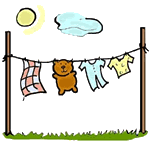Recently I stumbled upon this article online and had to post it here because it shows how people can be enriched with the
resources they already have. This what US Aid should focus their attention on. Instead of inventing new ideas for Africa why not reinvent what they already have- New eco
friendly fashion jewelry
I thank Candice Shih for this incredible story and wish everyone concerned luck-
Jewelry made from trash in Africa finds value
By Candice Shih
Orange County Register
Posted: 07/02/2010
It's not often one will stumble into a fashion design business while working with a charity in Uganda.
But it happened to Kallie Dovel, a 2008 graduate of Vanguard University in Costa Mesa.
Uganda is still recovering in many ways from a civil war, and Dovel met some of the women affected by the bloodshed in a refugee camp in Gulu in 2007.
She noticed they made necklaces from beads rolled from paper and trash and sold them to whoever might pass by.
When Dovel, now 23, returned home, she brought back boxes of the necklaces with her, sold them and sent the money back to these women.
"It got our minds rolling," says Alli Swanson, a friend and now business partner. "How could we do this?"
Rapid growth
Now Dovel, Swanson, Anna Nelson, Brooke Hodges and Jessie Simonson — all recent graduates of Vanguard — run a jewelry and shoe company called 31.
The name comes from the Bible's Proverbs 31, which describes a woman providing for her family. The "bits" refers to the bits of paper from which the beads are made.
Having started out with six women in Gulu, 200 miles from Uganda's capital of Kampala, 31 Bits now employs 60 women
.
Out of the five co-founders, usually two are working in Uganda and three in Costa Mesa at any given time.
Dovel is in Uganda now with Hodges. They live in a compound where the jewelry makers come to do their work.
"My day normally includes spending time with each lady making sure she is doing her assignment for the month correctly, rolling beads with her, getting supplies for them and answering any questions they might have about the designs," Dovel says in an e-mail.
"We change our designs almost every month for the ladies, so they are continually learning and mastering new designs."
Finding resources
According to Swanson, the 31 Bits partners on site will buy the raw materials in Kampala, which requires a six-hour ride on a chicken bus. The paper for the beads is all recycled, often originating as leftover material from printers. If it isn't the right color for the design, they will have it printed.
The Ugandans who make the beads first roll the paper and then apply a varnish to make them hard and waterproof. Then they are strung together. One worker might make 80 single-strand necklaces in a week.
Styles include chunky, single-strand necklaces and multistrand pieces with smaller beads. The women make bracelets, too.
Building partnerships
The jewelry is sold at stores such as Seed People's Market at the Camp in Costa Mesa and the Mariners Church Bookstore in Irvine for $25 to $55 for necklaces. Simpler styles are sold online at slightly lower prices.
31 Bits also formed a partnership with Reef sandals a year and a half ago. The paper beads form embellishments on Reef's T-strap leather shoes.
The "Ugandals" sell for $58 at Orange County venues Surfside, Jacks Surfboards, Huntington Surf & Sport and Even Sisters in Balboa Island.
With the money they make from working with 31 Bits, the Ugandan women "are sending their children and other orphans to school when they were not able to before, buying large amounts of local produce to sell, buying pigs, chickens, buying chairs and mattresses,"
Dovel says.
For Swanson, the contradictions of 31 Bits make sense.
"Here we are, five young girls who know nothing about starting a business. We're working with women who have nothing, and it's a product made out of trash. It's definitely not a recipe for success," she says.
"But that's the coolest thing about it. It works."
Where to buy: The jewelry may be purchased from the online store, 31bits.com If you"re visiting Southern California, you will find the products at Seed People"s Market in Costa Mesa and the Mariners Church Bookstore in Irvine.


















